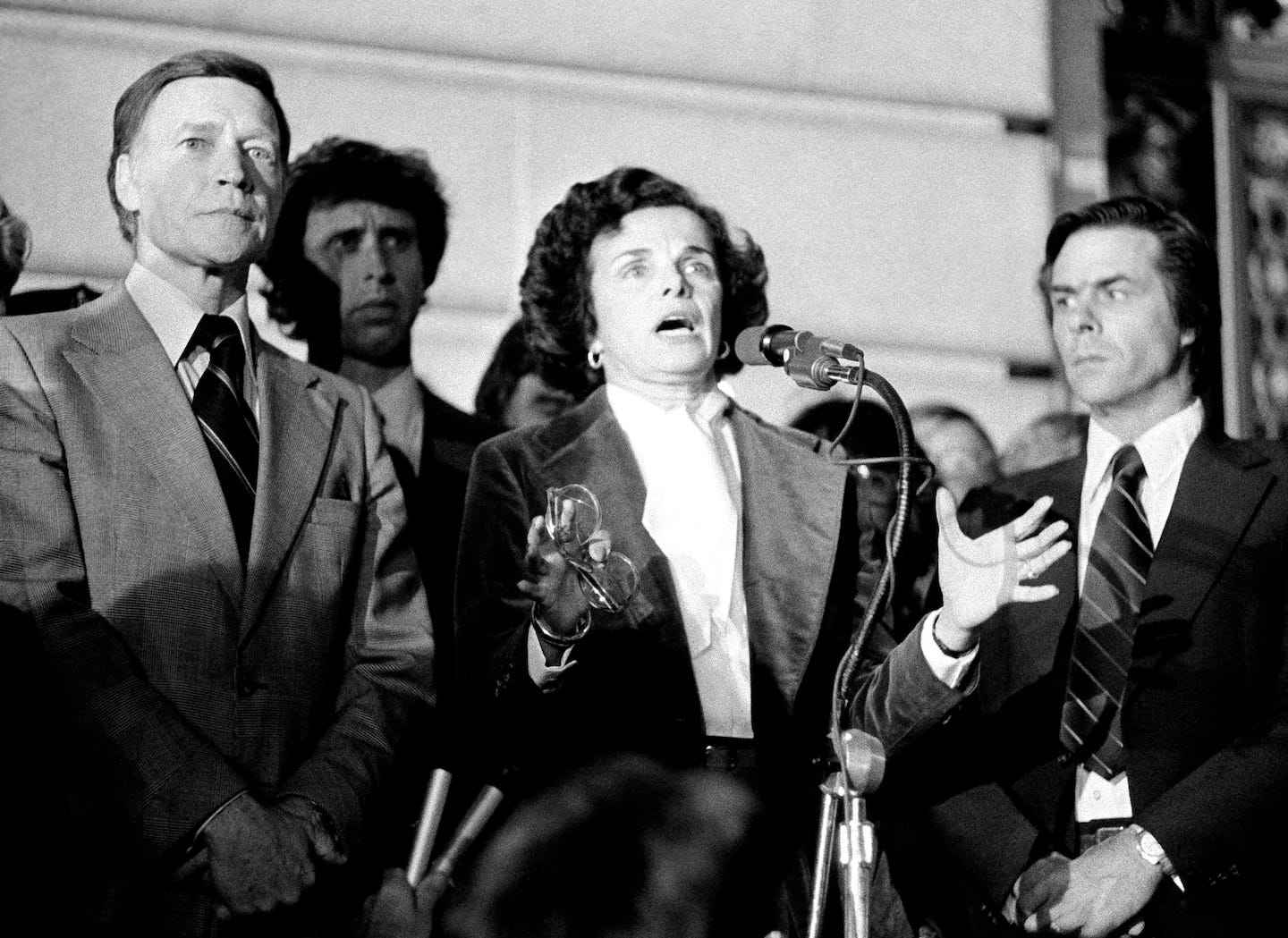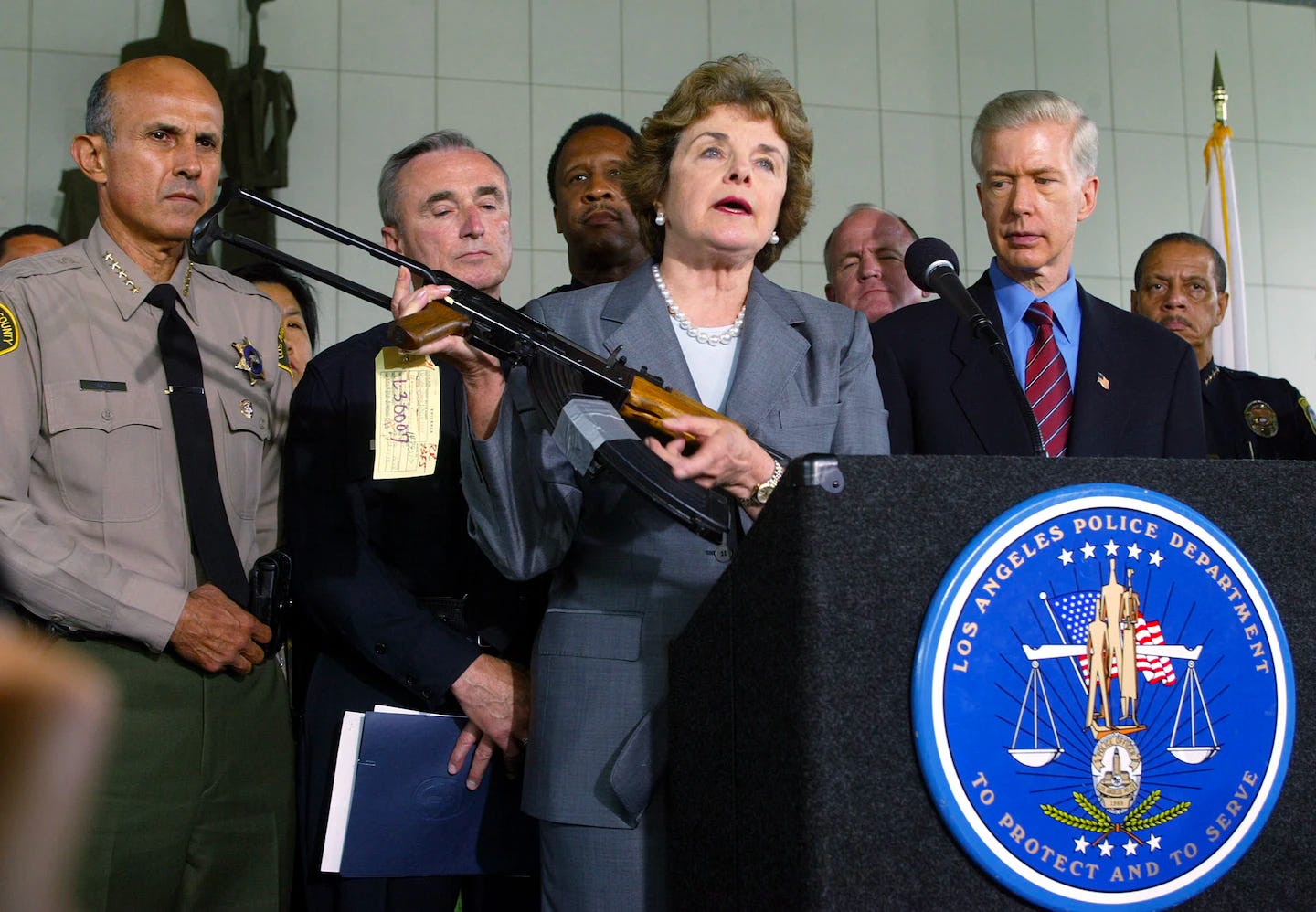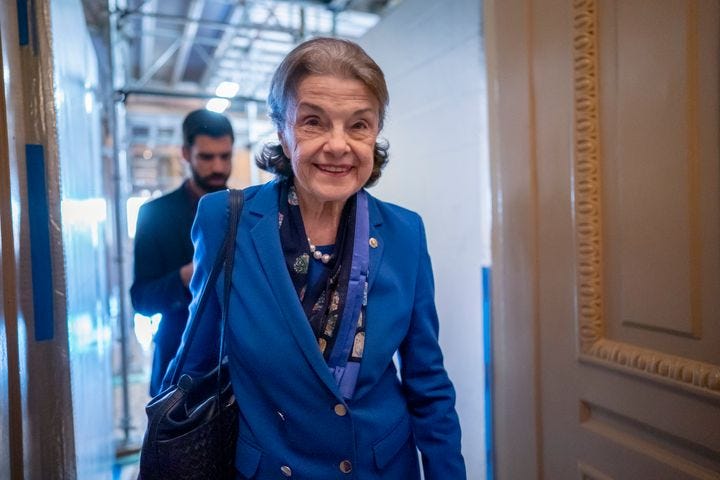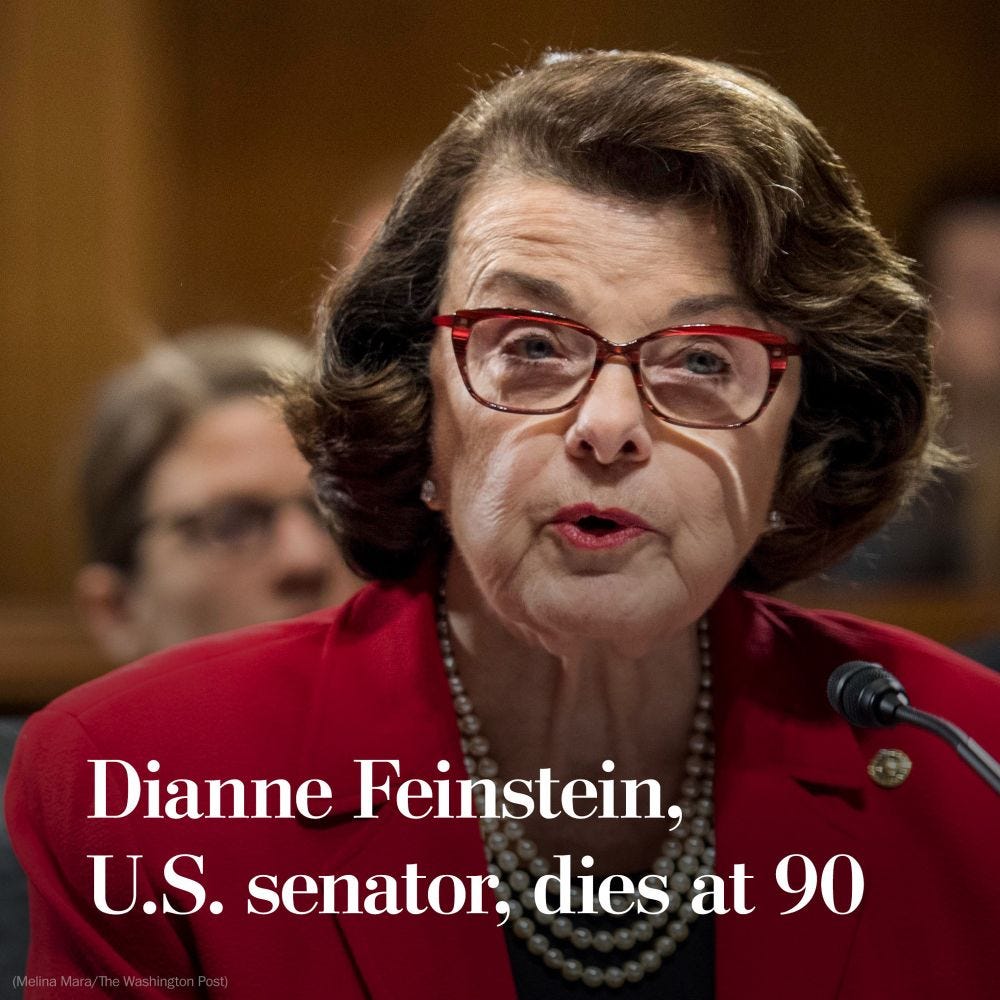"I have never believed that people elected me...just to go and be a rubber stamp"
Sen. Dianne Feinstein's legacy is one of big shoes to fill...and of a welcome overstayed
It was the morning of Nov. 27, 1978, and Dianne Feinstein, a future powerhouse of the U.S. Senate, had decided she was done with politics. After nine years on the San Francisco Board of Supervisors, two failed bids for mayor and the recent death of her husband from colon cancer, she wanted out.
Hours later, gunshots rang out in City Hall. Dan White, a disgruntled former supervisor, had fatally shot Mayor George Moscone and Supervisor Harvey Milk, one of the first openly gay elected officials in the United States. Mrs. Feinstein rushed to Milk and felt for a pulse. “My finger,” she later told the Los Angeles Times, “went into a bullet hole in his wrist.”
It wasn’t the most conventional entrance into the political spotlight, but Dianne Feinstein was made for a moment like the tragic one she found herself in. Under San Francisco’s succession ordinance, she became acting Mayor and remained in the office for nine years. She ran for Governor of California in 1990 and lost, but two years later won election to the US Senate, where she remained until her death late Thursday.
One of the longest-serving Senators, Feinstein served the country ably and well, but the argument must also be raised: Did she serve too long?
[S]he rose to become chairwoman of the Intelligence Committee and the top Democrat on the Judiciary Committee. During more than three decades in office, she delivered muscular support as well as withering criticism of the CIA, helped mold the federal bench, championed an assault weapons ban, and held down the center of the Democratic Party as it moved swiftly to the left.
She was the oldest sitting member of the Senate and the subject of increasing scrutiny over her fitness to serve. Mrs. Feinstein was hospitalized in February with shingles, an illness later reported to have been complicated by encephalitis.
She returned to the Senate in May after a nearly three-month absence. Her inability during that time to vote on Biden administration judicial nominees, along with gathering evidence of her cognitive decline, led even some admirers to urge the senator to resign to avoid tarnishing what was by all accounts a remarkable legacy as a stateswoman. In August she was briefly hospitalized after a fall at her home in San Francisco.
Near the end, she was dealing with memory issues but still casting votes in the Senate. She had difficulty following arguments and was prone to rambling discourses at yes or no votes. An argument could, and should, have been made that she was no longer fit to serve. That’s not a condemnation of Sen. Feinstein, merely a statement of fact.
She was also absent due to health issues almost as much as she was present. All of these things are issues to be expected of a person of advanced age…but not of a US Senator. And while I’ve long admired Sen. Feinstein for her character and courage, it’s seemed clear for some time that she should’ve stepped down long ago. The same holds for Republicans Mitch McConnell and Chuck Grassley, who appear to be holding on for the sake of the power and the perks they enjoy.

The Senate was never intended to be a place for those who can’t let go of power to age in place. “The world’s greatest deliberative body,” as it refers to itself, deals with some of the world’s weightiest and most consequential issues. Does it make sense to have people in their 80s and 90s, who may or may not be in complete control of their faculties, having a voice in those debates?
Sadly, Sen. Feinstein will be remembered as much for dying in office and the way her career wound down as for the many things she accomplished.
Mrs. Feinstein won her Senate seat in what became known as the Year of the Woman, an election that sent 24 new women to the House of Representatives and brought the total number of female senators to six.
The precipitating event was the 1991 confirmation hearings of Supreme Court nominee Clarence Thomas, who became the second Black justice on the high court. The proceedings pitted Anita Hill, a former colleague of Thomas’s who also was Black, against an all-male, all-White Senate Judiciary Committee that, in the view of many women, did not engage respectfully with Hill’s allegations that Thomas had sexually harassed her.
“Every woman that watched that changed,” Mrs. Feinstein told the New York Times in 2018. “I think change happened at that moment.”
It did. Unfortunately, that change was not as broad or deep as Sen. Feinstein and others had hoped. In an institution where men wore sober suits that doubled as uniforms, Feinstein far too often had to deal with comments on her appearance and her wardrobe instead of her competence and legislative chops.
As a moderate Democrat, she frequently disappointed more Liberal and Progressive Democrats, particularly feminists, who were tired of waiting for change that felt far too incremental. Sen. Feinstein’s approach wasn’t about burning things down but finding ways to work within the system to effect wide-ranging, long-lasting changes. She was a feminist who many thought didn’t “look” or act like a feminist. While celebrated by some women as a “trailblazer,” others were frustrated by what they felt was a lack of sufficient attention to women’s issues.
“I’ve lived a feminist life,” Mrs. Feinstein, who supported abortion rights, once told an interviewer. “I had to quit a job because there was no maternity leave. I raised a child as a single mother. I put together legislation. I haven’t been a marcher, but I’ve lived it.”
Mrs. Feinstein’s centrism dated to the earliest years of her political career. Her elevation to the office of mayor came on the heels of upheaval, including the mass suicide at Jonestown in Guyana — where many followers of cult leader Jim Jones were from San Francisco — and attacks by the New World Liberation Front terrorist group, which placed a bomb outside the bedroom window of Mrs. Feinstein’s daughter. For a time, Mrs. Feinstein owned a handgun.
“The lesson Dianne took from this craziness was that she had been right — that all this polarization and bitterness that was extant in the town had now led to these murders,” her biographer, Jerry Roberts, once told the New Yorker magazine, referring to the assassinations of Moscone and Milk. “That’s when she started talking about how the center is so important.”
In many respects, I have to agree with Sen. Feinstein’s position. I may be on the Far Left politically, but I also recognize that most Americans consider themselves somewhere in the center of the political/ideological spectrum.
That’s where the Senator felt the most ground could be gained- not by championing causes that drove a wedge between people, but rather by pushing issues that could find broad bipartisan support.

Her time in the Senate bridged the period when working across the aisle was still possible and now, when much of the GOP clown car equates compromise with capitulation. It’s hard to find common ground with those who consider their political adversaries to be the spawn of Satan. Nonetheless, Sen. Feinstein came of age politically when Democrats and Republicans in Washington could still be civil and reach across the aisle to do big things when called for.
Congress- especially the House- rarely does big things anymore because Republicans don’t want to do anything that results in a victory for Democrats generally and President Joe Biden specifically. Too many Republicans- the House Freedumb Caucus leaps immediately to mind- would rather see this President fail than America succeed.
Of all the legislation that crossed Mrs. Feinstein’s Senate desk, the bill with which she was most associated was the assault weapons ban that President Bill Clinton signed into law in 1994. The uphill effort showcased Mrs. Feinstein at her most determined. When a more senior senator, Larry Craig (R-Idaho), questioned her experience on gun issues, she reminded him that she had become mayor of San Francisco as a result of a double assassination. “I know something about what firearms can do,” she said.
The assault weapons ban expired in 2004. After the mass killing at Sandy Hook Elementary School in Newtown, Conn., where 20 first-graders and six adults were gunned down in 2012, Mrs. Feinstein spearheaded an unsuccessful effort to renew the law.
As a centrist, she championed America’s intelligence services while also subjecting them to rigorous oversight. Some observers admired her commitment to intelligence work and the supervision she took so seriously. Others were perplexed by her actions, feeling that she too often worked at cross-purposes with her stated goals.
Critics too often didn’t realize that Sen. Feinstein wanted America’s intelligence services to be above reproach as much as humanly possible, given the nature of the work required of the intelligence community.
In 2013, when The Washington Post and London’s Guardian newspaper exposed massive secret surveillance by the National Security Agency, Mrs. Feinstein defended the program and other efforts like it. “It’s called protecting America,” she declared.
As the Obama Administration passed into the Trump years, Sen. Feinstein worked from a leadership position in a minority party. As the 2020 election approached, the Senator was 87 and undeniably displaying cognitive decline and memory issues not uncommon for someone of that age.
Mrs. Feinstein announced in late 2020 that she would step down as the top Democrat on the Judiciary Committee. There were signs that, at 87, she was experiencing memory difficulties that in subsequent years became increasingly severe. In 2022, she suffered the loss of her husband of 42 years, investor Richard Blum.
In February, Mrs. Feinstein said she would not seek reelection the following year. U.S. Reps. Katie Porter, Adam B. Schiff and Barbara Lee, all Democrats, made the opening bids in what was expected to be a fierce battle for Mrs. Feinstein’s seat.
Even as her physical and cognitive difficulties became unavoidably apparent — after her months-long absence from the Senate when she was ill with shingles, she appeared to tell a reporter at the Capitol that she had never been gone — Mrs. Feinstein resisted any suggestions that she should step down before the end of her term.
“I’m back in Washington, voting and attending committee meetings while I recover,” Mrs. Feinstein said in a statement after her bout with shingles. “I continue to work and get results for California.”
To be sure, Sen. Feinstein was not the only Senator displaying the issues that often accompany advanced age. Sens. Mitch McConnell (R-KY) and Chuck Grassley (R-IA) are, it should be argued, both beyond their “sell-by” date.
McConnell, who’s 81, and Grassley, who turned 90 on September 17, have both displayed issues that raise concerns about their ability to serve. While I’m not here to engage in ageism, I don’t believe that a Senator serving at age 90 is a good thing.
No Senator should die in office. While Sen. Feinstein certainly couldn’t have anticipated her demise, her health issues were not recent discoveries and should have raised alarm bells about her ability to serve effectively.

I believe there needs to be age limits regarding public service across the board. A genuine, committed public servant should and will understand that age limits aren’t about them; it’s about ensuring that people serving in public office aren’t so old that they cannot carry out their duties effectively.
The other option would be requiring politicians to pass a cognitive competency test at a certain age and then yearly, in the same way some states require people to retake a driving test once they reach a specific age. I imagine that would be uncomfortable for a sitting Senator or any elected government official, but it’s not personal. It’s about protecting the country.
We need to trust that our elected representatives are in complete possession of their faculties. We weren’t able to do that with Dianne Feinstein, and we’re unable to do it with Mitch McConnell or Chuck Grassley- and there may be others in the Senate as well. America can’t afford to allow the Senate to turn into a retirement home where Senators age in place. There’s too much at stake to allow Senators to serve if they’re not in full possession of their faculties.
Dianne Feinstein should be remembered as a great Senator and a great woman. But we would do this country a disservice were we not to discuss what has become the biggest problem in the Senate. Too many Senators are aging in place, and that cannot be allowed to continue.
America deserves better.
(All of my posts are now public. Any reader financial support will be considered pledges- support that’s greatly appreciated but not required to get to all of my work. I’ll leave it to my readers to determine if my work is worthy of their monetary support and at what level. To those who do offer their support, thank you. It means more than you know.)







I have some hesitation around the age limits issue, as it is pretty close to age-ism, which I faced as early as my 40's in the tech industry, and my 50's in academia (no one will hire you for a full time position if you're over 35.) But having some objective standard like health as a criterion would be good. The operative word here is, of course, "objective." I don't care what his personal qua ... er, "doctor" claims, Trump is morbidly obese and has the mental acuity of a bent desert fork. Biden, on the other hand, is still sharp and in good shape (better than me, I suspect), despite being 3 years older than Jaba-the-Trump.